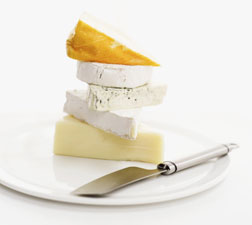Soft Cheese for a Clean Planet. A foodie's guide to planet-friendly fromage. I'm planning a big holiday shindig, and I was going to put out my usual enormous cheese-and-cracker spread. This year I've been wondering: What's the environmental impact of cheese?

Cheese is certainly one of life's great pleasures. (The Lantern is with Liz Lemon and G.K Chesterton on this point.) But there's no doubt that cheese of any type—pasteurized or not; made from the milk of cows or goats or sheep—has a significant impact on the environment compared with other food products. So by all means enjoy your spread, but it might be worth scaling back a bit on the size for the sake of the planet.
It turns out that cheese may do as much harm to the environment as some kinds of meat. Based on figures from Sweden, the production of a 1.5-ounce serving of cheese might be expected to produce around 16 ounces of carbon dioxide equivalent. Depending on which study you consult, a 2- to 3-ounce serving of cooked, boneless chicken meat should yield between 4.3 and 31 ounces of CO2-equivalent (PDF). (You'd get about the same number of calories from each.)
Why is cheese so resource-intensive? As we've discussed before, raising a milk-bearing animal puts out a significant amount of greenhouse gases, thanks in large part to the methane those ruminants emit. Feed production also contributes to global warming, and animal waste has implications for both water and air quality. A 2002 life cycle assessment of a popular Swedish semi-hard cheese (the Seussian-sounding Ängsgården Hushållsost) found that milk alone accounted for 94 percent of the total greenhouse gases—not to mention 99 percent of the acidic compounds, 93 percent of the smog-creating particles, and nearly 100 percent of the substances that contribute to eutrophication, a kind of fish-killing nutrient pollution.
The good news is that the American dairy industry hopes to cut its greenhouse gas emissions by 25 percent in the next 10 years, through strategies like adjusting cows' diets and installing methane digesters to turn manure into electricity. Some farms are already implementing these measures, so you might want to look at where cheese makers are getting their milk.
The Lantern realizes it won't be easy to track down this information. But if the eerily well-informed salespeople at her local fromagerie are any indication, provenance is becoming more important in the cheese world, at least on the fancy end of the spectrum. And while artisanal cheeses aren't necessarily going to be greener than the mass-produced kind—particularly given that small cheese plants tend to be less energy-efficient than large ones—you will be able to learn more about your cheese if it comes from a small producer. ( slate.com )
No comments:
Post a Comment